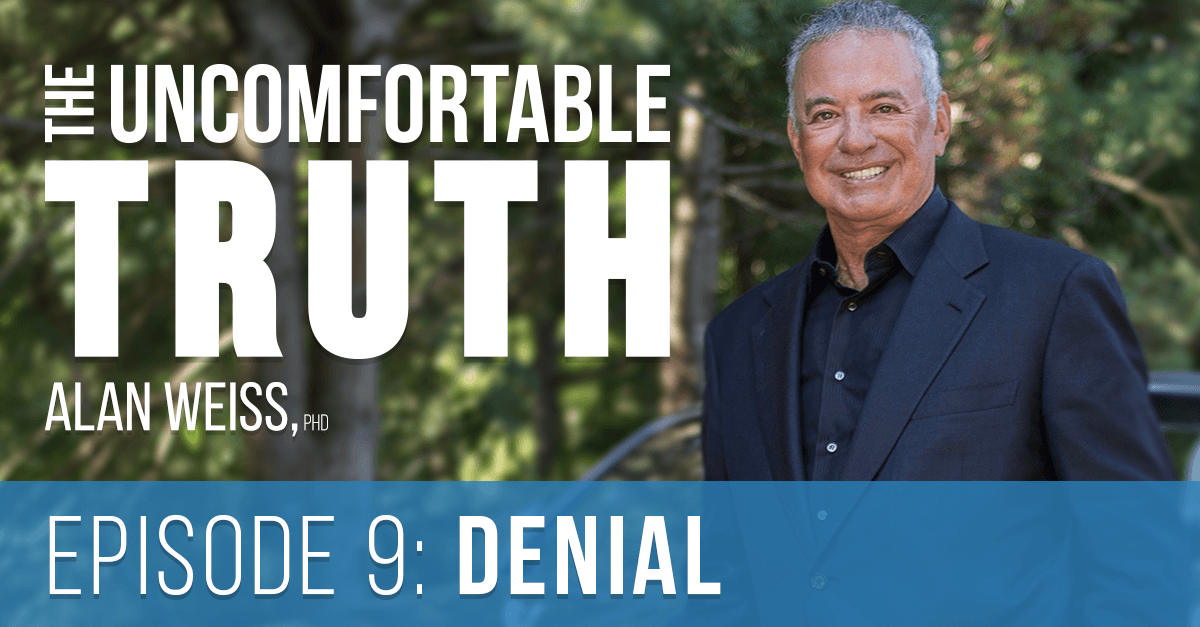
Episode 9: Denial
“Why we make ostriches’ behavior in the face of threat seem reasonable.”
Transcript:
“Hey, that wasn’t me. I should have won it. It was luck. It was a bad call. Somebody cheated. Come on, not me.”
I’m Alan Weiss with The Uncomfortable Truth, and today I’m talking about denial.
Denial occurs when we refuse to accept truths not consistent with our beliefs. “She was lucky to win the race. I’m a better athlete.” Yeah, but she won, didn’t she? “He only won because the voters were too ill-informed to vote intelligently.” Yeah, but he won, didn’t he? Denial is preservation, but only for a brief time, because the truth being ignored will win out in the end. Ignoring the truth, “I wasn’t prepared. I have to improve my skills. I didn’t show up,” only prolongs our disadvantage. Intense rationalization creates denial, and denial requires intense rationalization.
At a recent Democratic high-end fund raiser I attended, because I support the congressman who is running in that particular district, and he’s a friend, and I know him, and he’s a very good guy … But there were, as you might imagine, 20 zealous Democrats there, and they feel that only the morally inferior voted for Trump, that the intellectually inferior voted for Trump, that people didn’t get the real facts or they wouldn’t have voted for Trump, maybe that people wouldn’t vote for a woman. As well-qualified as Hillary was, show a woman, and people wouldn’t vote for her.
Maybe minority voters became too complacent, but the reality probably is something more like this. Black people, in particular, African-Americans, in particular, are not a whole lot better off today than they were after eight years of an Obama presidency. Now I’m not black, and maybe I have this all wrong, and maybe it’s hard for me to understand, but the black people I speak to tell me that. I think, objective observation, my empirical observation, tells me that. I think that, in reality, people were weary of traditional politics. They were tired of the same old, same old, the lies that everybody tells at all levels of the political game. I think they wanted an outsider and were willing to ignore severe defects, in order to vote for an outsider.
I think, too, that as much as Trump was hated by a lot of people, and by a lot of people for good reason, the Clintons were also despised, both of them, for good reason. I think jobs were the basic issue, and Trump seemed to promise more in the way of jobs, because the Democrats and the working class have had a huge rift. Their jobs were not being preserved. And the more Trump was belittled, it seemed the stronger his support got. And of course, the Democratic National Committee, the DNC, undermined their own person, Bernie Sanders, and then leaked a debate question or two, or three, or five to Hillary Clinton prior to the debate. That was with the ethical collapse of Donna Brazile. Of course, on top of that, there’s arrogance.
Now I’ll tell you this. I don’t mind telling you this. I did not vote for Trump. In fact, I wrote a long column on my blog talking about the fact that he’s a narcissistic nightmare, and I could not in good conscience vote for him, yet I’m not in denial about why the Democrats lost. The Democrats lost because of arrogance. The Democrats lost because they want to tell themselves that minorities will always vote for them, and women would naturally vote for a woman, and that working people would automatically vote for them, and that they didn’t assume that the election was in their pocket. The Democrats lost because of arrogance. Now maybe this will teach them a lesson, but not if they’re in denial. That’s the uncomfortable truth here.
Denial is a false defensive mechanism. It’s like the Maginot line or an ostrich with its head in the sand. After World War I, the French engaged in the Maginot line to keep any future German threat looking to the west, in check. The Maginot line was supposed to be impregnable. It was going to stop the Germans. Construction began in the 1930s. In 1940 or so when the Germans attacked France, they went right around the Maginot line and then over it. There was nothing there. It was a false defensive mechanism. An ostrich, as pitiful as it seems to us humans, is not much different from a human sticking its head in the sand. A lot of us refuse to look at reality. We deny it. We stick our heads in the sand. We stick our heads inside of our own black boxes, inside of our own rooms, inside of our own minds.
Here’s what you can’t deny today, or you can deny it at your peril if you seek to stay in denial. Kids are exposed to drugs and alcohol earlier than ever. When I was in eighth grade, I remember that two of my friends, I found out, were taking a different route home from school, and I couldn’t understand why. It was longer, but they went a different way from the way I went anyway. Then one day I happened to see them, and they were smoking. At 12, 13 years old they were smoking. That was rather shocking back then for kids that young to smoke.
Today, there’s a very clever commercial on TV with a young woman, maybe 14 or 15 or 16, telling her parents not even to begin worrying. They don’t have to speak with her about liquor. She never encounters it. They don’t have to worry about drugs. She’s not interested. If the subject ever comes up and they fell awkward, just don’t talk about it. She’s fine with it. Of course, the whole point is her parents are in denial and she’s lying through her teeth, but that’s the way it often is today. We never expect it’s our kids. We don’t pay attention. We’re in denial. It can’t be our kids.
Technology amplifies peer pressure negatively for youth. You can’t deny that today unless you want to deny it at your own peril. We see suicides from bullying. Now there’s always been bullying. It was terrible in my high school. I mean, big guys would say to me that they wanted a quarter or they weren’t going to let me into my own locker. I carried quarters around with me, quarters I couldn’t afford, but I did. I needed to get into my locker. Sometimes if they weren’t paid, they would break the lock on the locker and put their own lock on it so you couldn’t get in until you paid them, an early effective form of extortion. But technology amps all that up today because kids gang up on other kids, and they gang up on kids for no good reasons at all, except it seems to elevate the bullies. Of course, bullies are always insecure and looking to pull other people down to their level. That’s the problem with bullies, but it’s hard to confront them when they gather a vast Internet virtual force.
You can’t deny today that drunk driving accidents are caused primarily by repeat offenders who aren’t in jail. If you look at the statistics … And Mothers Against Drunk Driving and every other cause like that is fine and it’s important and people should not drive drunk, period. However, the people who are mostly involved in drunk driving accidents have already had their license suspended, or have been told they can’t drive cars, or are on probation, or have been denied insurance and have prior arrests for the exact same criminal activity but they haven’t been placed in jail or they’ve been let out of jail early. The problem with drunk driving isn’t stopping everybody in the world from having a glass of wine.
Some state out west, I believe it was Utah, just enacted the strictest drunk driving blood alcohol levels in the nation. I don’t know, .004 or something, but what it means is that a 150-pound man after two beers, depending on his metabolism and how much he’s eaten, could exceed the limit. An 120-pound woman after one glass of wine, again depending on those variables, could exceed the limit. I don’t think the idea here is to put everybody in jail who happens to drink. I think the idea here is to keep the people who are driving drunk off the roads. These are not a lot of new offenders. They’re repeat offenders. We deny that at our peril.
We can’t deny the fact, or we shouldn’t, that the legal system favors the wealthy. If you don’t believe that, binge watch the recent series on the O.J. Simpson trial with his dream team. Every day, in fact as I’m speaking and you’re listening, people with the exact same infractions, the exact same ticket, the exact same violation, the exact same arrest are not being treated equally, because those who can afford excellent lawyers are treated more leniently or are acquitted than those who have to rely on public defenders. That’s a weakness in our system. It causes grief. It causes resentment, and it should.
We can’t deny that the health system favors the wealthy. The health system will find better doctors for you if can pay more. Today we have concierge doctors. These are doctors who don’t take insurance. You pay them a retainer as you would consultant and they’re there when you need them, no waiting, no muss, no fuss. They’re good doctors, excellent doctors. Even in regular hospitals, people who can afford private rooms, and specialists, and the best kind of care, and post-op care, and home care will remain healthier, have the best chance for recovery, have the best chance to get the best kind of treatment. There’s no denying that, and it’s a shame. Everyone should have equal healthcare.
There’s no denying that the educational system favors the wealthy. No matter what the teachers’ unions say, the wealthier you are, the more you can send your kid to a private school. The wealthier you are, the more you can send your kid even to a public school where the tuitions are high but you can afford the tuitions. The wealthier you are, the more influence you have in the kind of school system your kid attends, because they’re based on the primitive mechanism of property tax, meaning if you live in an affluent suburb, you’re going to have higher tax rates which can afford more teachers and better facilities and better resources. In fact, the greatest part of any tax in a municipality goes toward education, the preponderance of it does. In the inner city, though, where prices are lower and lots and buildings and property aren’t worth as much, the taxes are lower. What happens? They get the worst teachers.
An uncomfortable truth is the fact that the teaching profession, revered when I was young … To become a teacher was a status thing, and teachers were listened to by parents and students. Today, teachers have the easiest courses of any major in college. They score lowest on the SATs. I talked to the president of the University of Rhode Island when I was an adjunct professor there, and he told me he thought it was all about debt. He said that people who can’t afford to pay much debt take courses that are easy in schools that are easy so they’re not burdened with it. But that’s what happens, you get teachers who aren’t excellent. The better off you are financially, the better education your kids are going to have, an uncomfortable truth.
These are insidious, continuing influences on our lives. Any outsider, going back to an election, who can remedy those kinds of things, ought to be elected in a landslide.
Cyber crime and cyber warfare are the new major threats to us. There’s something you can’t deny because, even now, credit cards are stolen with impunity from huge companies, from Target, from Kmart. We’re starting to see the ability of large nations such as our own to interfere with the nuclear reactors in Iran, and a good guess is the rocketry in Korea. Cyber crime, cyber warfare, you can’t deny that they’re going to be major threats.
Something else you can’t deny is that as opposed to oil, and gold, and minerals, and uranium, and so on, clean air and clean water are going to be the elements we fight over in the future, especially if we can’t control the sources. How would you like to be living next to India, with all of that crap, the most polluted country in the world, blowing over the border?
SO, what can we do? You can put your ego in the closet and start to be vulnerable, because we’re in denial when we refuse to be vulnerable. Tuck your ego away and open up to the possibility that you’re wrong. Talk to people who don’t agree with you and listen.
One of the most embarrassing, horrible events in the United States these days occurs on college campuses where, in the spirit of free speech, speakers are shouted off stage. Brown University won’t call a Christmas tree a Christmas tree. It’s named after the greatest slave trading family in the history of the republic, yet when the police commissioner comes up to talk about things from New York City, they boo him off the stage. You have to talk to people and listen to people who don’t agree with you if you’re going to learn.
Never assume that you have the moral and intellectual high ground. That’s the kind of arrogance that loses more than elections. It loses your value system. You’re not better than people who disagree with you. You simply disagree. That’s something you need to keep in mind because that’s an uncomfortable truth. We’re all imperfect mortals. It’s rather important not to forget that.
In this spirit, I’d like to remember to remind you to remember to take a look at Lifestorming, Marshall Goldsmith’s and my latest book together. We think it’s the ability and the royal road to controlling your life and your future. In the spirit of The Uncomfortable truth, we hope you’ll take a look at it for yourself. Lifestorming.
I’ll see you next time.





